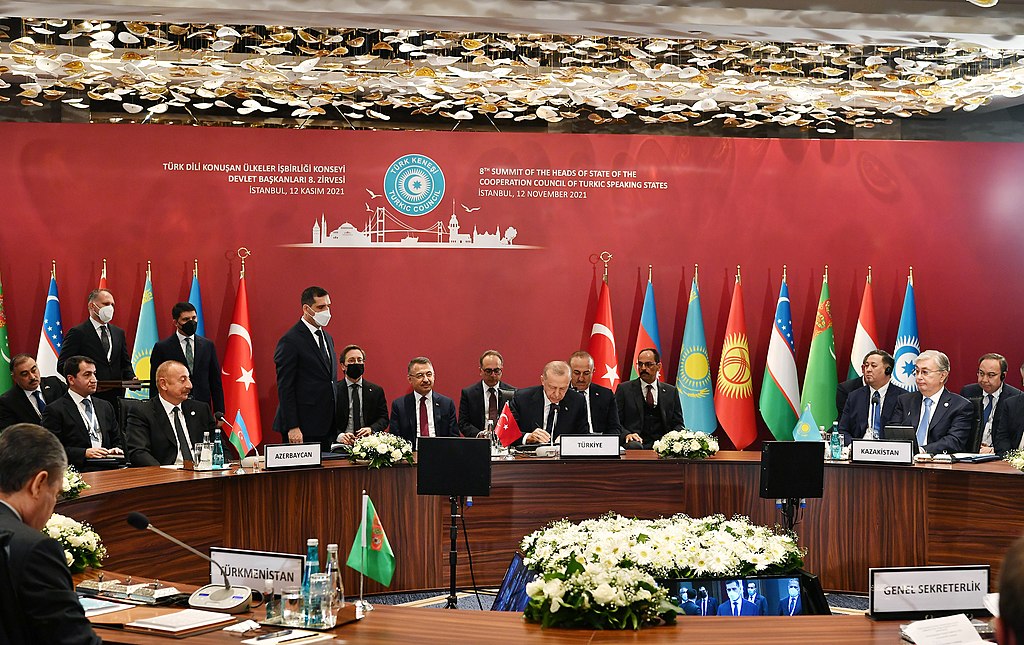The Turanian World advance in Central Asia
The Turkish focus on the South Caucasus has shown how advantageous an alliance with Ankara is, capable of replacing the one with the Russians engaged in Ukraine. In the background is the great project of a ‘Middle Corridor’, linking Asia to Europe bypassing Moscow.
Moscow (AsiaNews) - Several commentators in the Western and Central Asian media are trying to understand the extent to which Turkey's influence in Central Asia is growing, taking advantage of the weakening role of Russia at the regional level to relaunch its own ‘neo-Ottoman’ projects of a Greater Turkic World.
In this context of geopolitical transitions, the West is also trying to insert itself in order to create ties that give greater access to the many natural resources of Central Asia, mainly removing them from the Kremlin's sights.
Swedish Institute for International Relations expert Joan Engvall published an article on this subject in the American magazine National Interest, recalling how precisely Russia, following the isolation due to the sanctions regime for the invasion of Ukraine, has undertaken a very ‘opportunistic’ rapprochement in economic relations with Turkey.
Turkish exports to Russia have increased greatly, but according to Engvall not everything is working ideally, precisely because of competition from countries in the Caucasus and Central Asia, which Moscow is increasingly struggling to control.
Turkey has been strengthening its presence in the Caspian area since 2020, against the background of the Nagorno Karabakh war between Azerbaijan and Armenia. With military support Baku has taken some of the credit for the recovery of parts of Azerbaijani territory, as a symbol of the enlargement of the Turkic-speaking regions.
In September 2023, ‘under the eyes of Russian peacekeepers’, as Engvall points out, the whole of Karabakh returned to Azerbaijani hands, until the Russians withdrew their troops completely in April this year. The Turkish focus on the South Caucasus has shown how beneficial the alliance with Ankara is for all Turkic countries, replacing the one with the Russians engaged in Ukraine, as a security guarantee all the way to Central Asia.
Another major project unites these states with Turkey, that of the Transcaspian transport corridor, bypassing routes involving Russia, also known as the Middle Corridor, which combines automobile, railway and water routes to unite Asia with Europe. Kazakhstan, Azerbaijan, Georgia and Turkey are very actively participating in it, with the aim of creating a common development route by 2027, which will allow the increase of transport from 2 to 10 million tonnes of freight.
The countries involved are committed to eliminating customs and trade barriers, widening the narrowest spaces in seaports and mountain valleys, and the EU has decided to participate in the project with funding of USD 10 billion.
All this is part of the design of the Organisation of the Turkic Countries, in which Turkey, Azerbaijan, Kazakhstan, Kyrgyzstan and Uzbekistan participate for the time being. They have approved the programme ‘Future of the Turkic World-2040’ to support common development in education, trade and capital mobility, services and technology, up to human, cultural and religious relations, seeking to imitate the model of the European Union itself in many fields.
Also in diplomatic relations, many transformations are taking place in the countries of the South Caucasus and Central Asia, seeking to diversify and become more independent internationally, always with the support of Turkey and as an alternative to Russia.
The Australian agency Conversation also analyses the increased independence in the political line of the Central Asian countries. As Anastasia Mahone, a lecturer at the British university Aberystwyth, writes, ‘a total break in relations with Russia is unlikely, due to geographical proximity and economic dependence, but there are signs that the Central Asian countries intend to take increasingly autonomous positions, without always looking to Moscow’.
He recalls the statements against Russian annexations in Ukraine by the President of Kazakhstan, Kasym-Žomart Tokaev, and other distances taken in recent years by various leaders in the region. In his opinion, ‘Central Asia walks a very fine balance between the past and the future and between East, West, North and South’.
12/02/2016 15:14
24/10/2019 17:56







.png)










